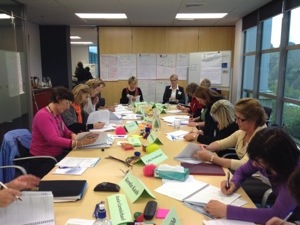The power of mentoring
 We have all had a hero – a role model we have admired and shaped ourselves on.
We have all had a hero – a role model we have admired and shaped ourselves on.
One of mine was Meredith – Meredith was the chair of the SA Women’s Advisory Council – my first role outside of my local district. I admired Meredith’s skills as a chair – she was warm, inclusive and kept us on track. Meredith was my informal mentor.
Imagine how powerful the relationship could have been if I had had the courage to ask Meredith to be my mentor – instead of watching and learning from afar I could have discussed with her what she was thinking, how she planned those meetings – and fast tracked my learning.
How many of you have had an informal mentor someone like Meredith you admired from afar? What about a formal mentor?
What is mentoring?
“The mentor knows how to answer many great questions asked by the mentee and pass on their experience.” The Forton Group.
The key for me in the definition is “questioning” The mentor is a guide who walks with the mentee – they have some of the knowledge to answer the great questions however we don’t have to know everything to be a great mentor It’s more about sharing and developing of the skills of our mentee, sharing our networks and questioning the mentee to assist them to develop their own skills and knowledge. Creating possibility.
We have formal and informal mentors and it the formalising of the process that makes it powerful. We should encourage people to approach us to formalise the process and approach mentors ourselves. We are never too old to have a mentor, its not about age.
I will share of couple of personal mentoring examples …
1. Last year I was a volunteer mentor for APEN (Australasia-Pacific Extension Network) where I mentored a young woman for 8 months. I enjoyed working with her enormously – the benefits for me were fantastic – the sharing of her achievements and watching her grow in confidence.
“I had what I thought were a lot of professional difficulties but through mentoring my mountains became molehills and I learnt a variety of new skills to deal with my work. I gained work life balance which was practically non existent – my mentor taught me skills for life.”
2. Over a year ago I approached a young woman who had transferred into South Australia in an agricultural role and offered myself as a mentor – the gremlin in my head was busy telling me “what did I have to offer” however I stuck my neck out and offered anyway – the young woman took up my offer and we continue to work together regularly.
In Ag Consulting Co we often work with young people who have chosen agriculture as a career and build mentoring into our training programs. These young people tell me regularly about the need for more people with mentoring skills in the industry
Mentoring is a skill underpinned by coaching and understanding the role of a coach greatly enhances the skills of a mentor. Training in the art of mentoring makes the relationship even more effective – the next blog will be about coaching.
It would be great to hear about some of your mentoring experiences… I look forward to some comments.


